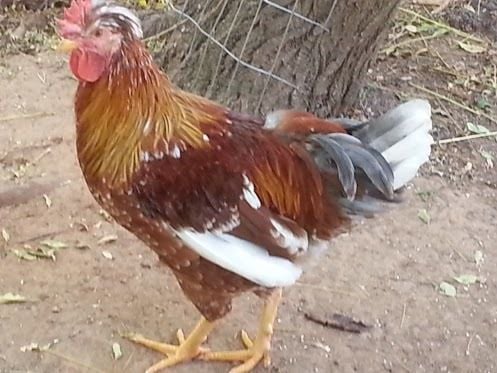I came home after work today to find my beautiful 6 month old Swedish Flower hen crouched by the fence. I rushed over to pick her up and within 2 minutes she died in my arms. We had not seen any previous signs of her being ill. No other chickens are acting strange.
Here is what I found after I settled down and looked her over thoroughly..... She had a soft, slightly swollen abdomen - I did not feel an egg impacted back there - she had not started laying yet. Her abdomen was kind of mushy....? Her crop seemed empty. She had a bit of crusty stuff around her neck - like maybe she had slobbered a little bit. It was a white crusty stuff almost like dried salt at the base of her feathers. I also noticed a few mites running under her wings. Not a lot of them but several.
I keep diatomaceous earth in the nest boxes, around the edges of the coup and I dust the perches. They take dust baths every day in the dirt. They are up at night and free range during the day. Even though it is cool here, my 8 month old pullets are laying very well and some of my 6 month olds are starting to lay. There is plenty of chicken feed available and I also give them treats of dried mealworms, millet and oatmeal. I grind flax to put in with their chicken feed and also add the Ultra Kibble (Farmer's Helper) to the bags of feed. I keep a flock block for them and oyster shell as well. I also use the Oxine in their water and keep their coup cleaned out weekly with fresh shavings after I strip it every week.
I have tried so hard to make sure they are well cared for and healthy. I hatched this little girl from an egg I ordered off eBay (along with several others). I am so distraught over losing her as she was the only Swedish hen that I got from the hatch - the other is a gorgeous rooster that was to be her mate. They both have the fluffy topped heads. I keep the roosters separate from the hens so the hens aren't aggravated by them.
Any info would be gratefully appreciated. Here is a picture of her future "husband", they were the same age. I'm trying to find a picture of her....
Angela

Here is what I found after I settled down and looked her over thoroughly..... She had a soft, slightly swollen abdomen - I did not feel an egg impacted back there - she had not started laying yet. Her abdomen was kind of mushy....? Her crop seemed empty. She had a bit of crusty stuff around her neck - like maybe she had slobbered a little bit. It was a white crusty stuff almost like dried salt at the base of her feathers. I also noticed a few mites running under her wings. Not a lot of them but several.
I keep diatomaceous earth in the nest boxes, around the edges of the coup and I dust the perches. They take dust baths every day in the dirt. They are up at night and free range during the day. Even though it is cool here, my 8 month old pullets are laying very well and some of my 6 month olds are starting to lay. There is plenty of chicken feed available and I also give them treats of dried mealworms, millet and oatmeal. I grind flax to put in with their chicken feed and also add the Ultra Kibble (Farmer's Helper) to the bags of feed. I keep a flock block for them and oyster shell as well. I also use the Oxine in their water and keep their coup cleaned out weekly with fresh shavings after I strip it every week.
I have tried so hard to make sure they are well cared for and healthy. I hatched this little girl from an egg I ordered off eBay (along with several others). I am so distraught over losing her as she was the only Swedish hen that I got from the hatch - the other is a gorgeous rooster that was to be her mate. They both have the fluffy topped heads. I keep the roosters separate from the hens so the hens aren't aggravated by them.
Any info would be gratefully appreciated. Here is a picture of her future "husband", they were the same age. I'm trying to find a picture of her....
Angela

 He is worth his weight in gold!!
He is worth his weight in gold!!